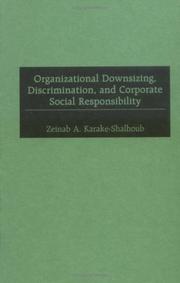| Listing 1 - 10 of 15 | << page >> |
Sort by
|
Book
ISBN: 9811649006 9811648999 Year: 2021 Publisher: Singapore : Springer,
Abstract | Keywords | Export | Availability | Bookmark
 Loading...
Loading...Choose an application
- Reference Manager
- EndNote
- RefWorks (Direct export to RefWorks)
Downsizing of organizations --- Electronic industries --- Japan --- Economic conditions --- Corporate downsizing --- Organizational downsizing --- Retrenchment of organizations --- Retrenchment, Organizational --- Organizational change --- Employees --- Dismissal of

ISBN: 2738468713 9782738468710 Year: 1998 Publisher: Paris: L'Harmattan,
Abstract | Keywords | Export | Availability | Bookmark
 Loading...
Loading...Choose an application
- Reference Manager
- EndNote
- RefWorks (Direct export to RefWorks)
Downsizing of organizations --- Personnel management --- Personnel --- Case studies --- Réduction --- Cas, Etudes de --- Direction --- Employees --- Dismissal of --- bedrijfsreorganisatie --- organisaties, verandering --- bedrijfsprocessen --- human resources management --- case studies --- Réduction --- Laborers --- Workers --- Persons --- Industrial relations --- Corporate downsizing --- Organizational downsizing --- Retrenchment of organizations --- Retrenchment, Organizational --- Organizational change --- Downsizing of organizations - Case studies --- Employees - Dismissal of - Case studies --- Personnel management - Case studies

ISBN: 0875463517 0801484340 1501725769 Year: 1996 Publisher: New York : ILR Press,
Abstract | Keywords | Export | Availability | Bookmark
 Loading...
Loading...Choose an application
- Reference Manager
- EndNote
- RefWorks (Direct export to RefWorks)
Downsizing of organizations --- Plant shutdowns --- Personnel --- Usines --- Case studies --- Réduction --- Cas, Etudes de --- Fermeture --- 65.01 --- 65.01 Methods and methodology. Theory and practice of organization --- Methods and methodology. Theory and practice of organization --- Closing of factories --- Plant closings --- Plant closures --- Shutdown of factories --- Deindustrialization --- Factories --- Corporate downsizing --- Organizational downsizing --- Retrenchment of organizations --- Retrenchment, Organizational --- Organizational change --- Employees --- Dismissal of

ISBN: 0199248699 0199248702 Year: 2002 Publisher: Oxford : Oxford University Press,
Abstract | Keywords | Export | Availability | Bookmark
 Loading...
Loading...Choose an application
- Reference Manager
- EndNote
- RefWorks (Direct export to RefWorks)
Downsizing of organizations --- Personnel management --- Personnel --- Case studies --- Réduction --- Cas, Etudes de --- Direction --- 65.01 --- 331.5 --- -#SBIB:316.334.2A500 --- Corporate downsizing --- Organizational downsizing --- Retrenchment of organizations --- Retrenchment, Organizational --- Organizational change --- Employees --- Methods and methodology. Theory and practice of organization --- Arbeidsmarkt. Werkgelegenheid --(algemeen) --- Organisatiesociologie: algemeen --- Dismissal of --- 331.5 Arbeidsmarkt. Werkgelegenheid --(algemeen) --- 65.01 Methods and methodology. Theory and practice of organization --- Réduction --- #SBIB:316.334.2A500

ISBN: 9780822345800 9780822345992 0822345994 0822345803 0822391376 1283335212 9786613335210 Year: 2009 Publisher: Durham, N.C. Duke University Press
Abstract | Keywords | Export | Availability | Bookmark
 Loading...
Loading...Choose an application
- Reference Manager
- EndNote
- RefWorks (Direct export to RefWorks)
Money market. Capital market --- Money. Monetary policy --- United States --- Securities industry --- Stockbrokers --- Investment banking --- Downsizing of organizations --- Agents de change --- Banques d'affaires --- Personnel --- Employees. --- Réduction --- -Stockbrokers --- -Investment banking --- -Downsizing of organizations --- -#SBIB:39A4 --- #SBIB:33H15 --- #SBIB:316.334.2A60 --- 331.76133264273 --- Corporate downsizing --- Organizational downsizing --- Retrenchment of organizations --- Retrenchment, Organizational --- Organizational change --- Employees --- Banks and banking, Investment --- Investment banks --- Financial institutions --- Securities --- Investment brokers --- Securities dealers --- Security traders --- Stock brokerage firms --- Stock brokers --- Brokers --- Financial services industry --- Toegepaste antropologie --- Economie: geld en krediet --- Economische sociologie --- Dismissal of --- Réduction --- #SBIB:39A4 --- United States of America

ISBN: 1567202519 9786610913763 1429473193 1280913762 0313007543 9781429473194 9780313007545 9798400693908 Year: 1999 Publisher: Westport, Conn : London : Quorum, Bloomsbury Publishing,
Abstract | Keywords | Export | Availability | Bookmark
 Loading...
Loading...Choose an application
- Reference Manager
- EndNote
- RefWorks (Direct export to RefWorks)
Social responsibility of business. --- Downsizing of organizations. --- Discrimination in employment. --- Entreprises --- Personnel --- Discrimination dans l'emploi --- Responsabilité sociale --- Réduction --- BUSINESS & ECONOMICS --- Organizational Behavior --- Management --- Business & Economics --- Management Styles & Communication --- Responsabilité sociale --- Réduction --- Bias, Job --- Employment discrimination --- Equal employment opportunity --- Equal opportunity in employment --- Fair employment practice --- Job bias --- Job discrimination --- Race discrimination in employment --- Corporate downsizing --- Organizational downsizing --- Retrenchment of organizations --- Retrenchment, Organizational --- Business --- Corporate accountability --- Corporate responsibility --- Corporate social responsibility --- Corporations --- CSR (Corporate social responsibility) --- Industries --- Social responsibility, Corporate --- Social responsibility of industry --- Social responsibility --- Employment (Economic theory) --- Organizational change --- Employees --- Business ethics --- Issues management --- Dismissal of --- Social aspects --- Affirmative action programs
Book
ISBN: 1501717103 9781501717109 9781501717116 1501717111 9781501717093 150171709X 9781501717093 1501755307 9781501755309 Year: 2018 Publisher: Ithaca, NY : Cornell University Press,
Abstract | Keywords | Export | Availability | Bookmark
 Loading...
Loading...Choose an application
- Reference Manager
- EndNote
- RefWorks (Direct export to RefWorks)
In this bold new perspective on the United States-China power transition, Paul K. MacDonald and Joseph M. Parent examine all great power transitions since 1870. They find that declining and rising powers have strong incentives to moderate their behavior at moments when the hierarchy of great powers is shifting. How do great powers respond to decline? they ask. What options do great powers have to slow or reverse their descent?In Twilight of the Titans, MacDonald and Parent challenge claims that policymakers for great powers, unwilling to manage decline through moderation, will be pushed to extreme measures. Tough talk, intimidation, provocation, and preventive war, they write, are not the only alternatives to defeat. Surprisingly, retrenchment tends not to make declining states tempting prey for other states nor does it promote domestic dysfunction. What retrenchment does encourage is resurrection. Only states that retrench have recovered their former position.MacDonald and Parent show how declining states tend to behave, what policy options they have to choose from, how rising states respond to decline, and what conditions reward which strategies. Using case studies that include Great Britain in 1872 and 1908, Russia in 1888 and 1903, and France in 1893 and 1924, Twilight of the Titans offers clear evidence that declining powers have a wide array of options at their disposal and offers guidance on how to use the right tools at the right time. The result is a comprehensive rethinking of power transition and hegemonic war theories and a different approach to the policy problems that declining states face. What matters most, the authors write, is the strategic choices made by the great powers.
International relations. --- Regression (Civilization) --- Hegemony. --- Great powers. --- Powers, Great --- Super powers --- Superpowers --- World politics --- Hegemonism --- Political science --- Sociology --- Unipolarity (International relations) --- Decline of civilization --- Civilization --- Progress --- Coexistence --- Foreign affairs --- Foreign policy --- Foreign relations --- Global governance --- Interdependence of nations --- International affairs --- Peaceful coexistence --- World order --- National security --- Sovereignty --- Philosophy --- realist foreign policy, cutting the defense budget, decline and retrenchment.

ISBN: 0521482097 0521484324 0511625650 Year: 1997 Publisher: Cambridge : Cambridge University Press,
Abstract | Keywords | Export | Availability | Bookmark
 Loading...
Loading...Choose an application
- Reference Manager
- EndNote
- RefWorks (Direct export to RefWorks)
Heroic Defeats is a comparative investigation of how unions and firms interact when economic circumstances require substantial job loss. Using simple game theory to generate testable propositions about when these situations will result in industrial conflict, Professor Golden illustrates the theory in a range of situations between 1950 and 1985 in Japan, Italy, and Britain. Additionally, the author shows how the theory explains why strikes over job loss almost never occur in postwar unionised firms in the United States. With its blend of rational choice and comparative politics, Heroic Defeats is the first systematic attempt to account for industrial conflict or its absence in situations of mass job loss. This book should be of interest to political scientists, sociologists, economists, and students of labour and industrial relations, as well as specialists in European and Japanese history.
Downsizing of organizations --- Labor unions --- Labor disputes --- Personnel --- Syndicats --- Travail --- Case studies. --- Case studies --- Réduction --- Cas, Etudes de --- Conflits --- -Labor disputes --- -Labor unions --- -#SBIB:316.334.2A452 --- #SBIB:316.334.2A561 --- #SBIB:HIVA --- Industrial unions --- Labor, Organized --- Labor organizations --- Organized labor --- Trade-unions --- Unions, Labor --- Unions, Trade --- Working-men's associations --- Labor movement --- Societies --- Central labor councils --- Guilds --- Syndicalism --- Actions, Job --- Disputes, Labor --- Industrial disputes --- Job actions --- Industrial relations --- Corporate downsizing --- Organizational downsizing --- Retrenchment of organizations --- Retrenchment, Organizational --- Organizational change --- Employees --- Arbeidssociologie: syndicale actievormen en strategieën m.b.t. de werkloosheid --- Partijen en strategieën in de onderneming: staking en lock-out --- Law and legislation --- Dismissal of --- Réduction --- #SBIB:316.334.2A452 --- Social Sciences --- Political Science

ISBN: 1280207337 9786610207336 0306471817 0306463008 Year: 2002 Publisher: New York, New York : Kluwer Academic Publishers,
Abstract | Keywords | Export | Availability | Bookmark
 Loading...
Loading...Choose an application
- Reference Manager
- EndNote
- RefWorks (Direct export to RefWorks)
The background for the international research conference “Health Hazards and Challenges in the New Working Life” was the emerging questions concerning the health and social effects of the rapid changes in the labour market leading to increasing long-term unemployment, temporary employment and irregular employment contracts. We knew that other countries have had this development at the labour market for a much longer time than Sweden has and it seemed a good idea to invite interested researchers and practitioners to an international seminar to share the relevant research findings and discuss future research needs. Thus, the first international, interdisciplinary research conference on “Health Hazards and Challenges in the New Working Life” was arranged in Stockholm during the last year of the 2nd millennium but was directed towards the foreseen development during the next millennium. We were very pleased that more than 200 participants came to a cold and dark country just after New Year’s Eve, and that it was a truly multidisciplinary setting. It became very obvious that it is necessary for the occupational health and safety research community to reach out to the public health research community as well as to the social and political sciences in order to understand the determinants and to perform comprehensive analyses at several levels in this new labour market situation.
Unemployed --- Unemployment --- Downsizing of organizations --- Job stress --- Health and hygiene --- Health aspects --- Psychology. --- Sociology. --- Health psychology. --- Personality. --- Social psychology. --- Personality and Social Psychology. --- Sociology, general. --- Health Psychology. --- Arbeids- en organisatiepsychologie --- arbeidsmarkt. --- Consciousness. --- Psychology, clinical. --- Health psychology --- Health psychology, Clinical --- Psychology, Clinical health --- Psychology, Health --- Salutogenesis --- Clinical psychology --- Medicine and psychology --- Social theory --- Social sciences --- Mass psychology --- Psychology, Social --- Human ecology --- Psychology --- Social groups --- Sociology --- Personal identity --- Personality psychology --- Personality theory --- Personality traits --- Personology --- Traits, Personality --- Individuality --- Persons --- Self --- Temperament --- Corporate downsizing --- Organizational downsizing --- Retrenchment of organizations --- Retrenchment, Organizational --- Organizational change --- Employees --- Occupational stress --- On-the-job stress --- Organizational stress --- Stress in the workplace --- Work stress --- Workplace stress --- Psychology, Industrial --- Stress (Physiology) --- Stress (Psychology) --- Work --- Jobless people --- Out-of-work people --- Unemployed people --- Unemployed workers --- Labor supply --- Joblessness --- Employment (Economic theory) --- Full employment policies --- Manpower policy --- Underemployment --- Dismissal of --- Physiological aspects --- Psychological aspects

ISBN: 0306463334 9780306471876 9786610207398 1280207396 0306471876 9781280207396 9780306471872 Year: 2000 Publisher: New York, United States : Kluwer Academic : Plenum Publishers,
Abstract | Keywords | Export | Availability | Bookmark
 Loading...
Loading...Choose an application
- Reference Manager
- EndNote
- RefWorks (Direct export to RefWorks)
This book is the fruit of a number of years of assimilating another culture and learning about the evolution of its institutions, altogether an incredibly rich and rewarding experience. I hope to pass onto the reader some of that richness in the belief that, even in a “globalizing” context, learning about other nations and cultures is more and more necessary. The reasons and values behind this belief are perhaps evident, but I am convinced that they bear repeating here. To begin with, the hasty generalizations that often lie behind the cynicism—and ultimately the violence—of ethnocentrism and xenophobia are still being aired today and still need to be fought, even in “unified and advanced” regions of the world like Europe and the United States. The historical and social sciences disciplines need to be solicited constantly in this combat, even though they themselves are terrains of controversy and contestation. I personally have not lost faith in their “progressive” potential and character. Second, my belief is that only through this process of appeal to these disciplines and their findings can we resist a dangerous contemporary slide into simplistic and sensationalist pictures of the world—viewpoints often associated with an implicit assumption that social and economic change are linear processes, so- how unfolding according to the same neat “logic” wherever they are at work.
Industrial relations --- Management --- Collective bargaining --- Labor supply --- Downsizing of organizations --- Labor contract --- Relations industrielles --- Personnel --- Négociations collectives --- Marché du travail --- Contrat de travail --- Employee participation --- Effect of technological innovations on --- Participation à la gestion --- Effets des innovations sur --- Réduction --- EPUB-LIV-FT SPRINGER-B --- Management. --- Personnel management. --- Labor economics. --- Sociology, general. --- Human Resource Management. --- Labor Economics. --- Sociology. --- Economics --- Corporations --- Employment management --- Human resource management --- Human resources management --- Manpower utilization --- Personnel administration --- Public administration --- Employees --- Employment practices liability insurance --- Supervision of employees --- Administration --- Organization --- Social theory --- Social sciences --- Personnel management --- Corporate downsizing --- Organizational downsizing --- Retrenchment of organizations --- Retrenchment, Organizational --- Organizational change --- Labor force --- Labor force participation --- Labor pool --- Work force --- Workforce --- Labor market --- Human capital --- Labor mobility --- Manpower --- Manpower policy --- Dismissal of
| Listing 1 - 10 of 15 | << page >> |
Sort by
|

 Search
Search Feedback
Feedback About UniCat
About UniCat  Help
Help News
News